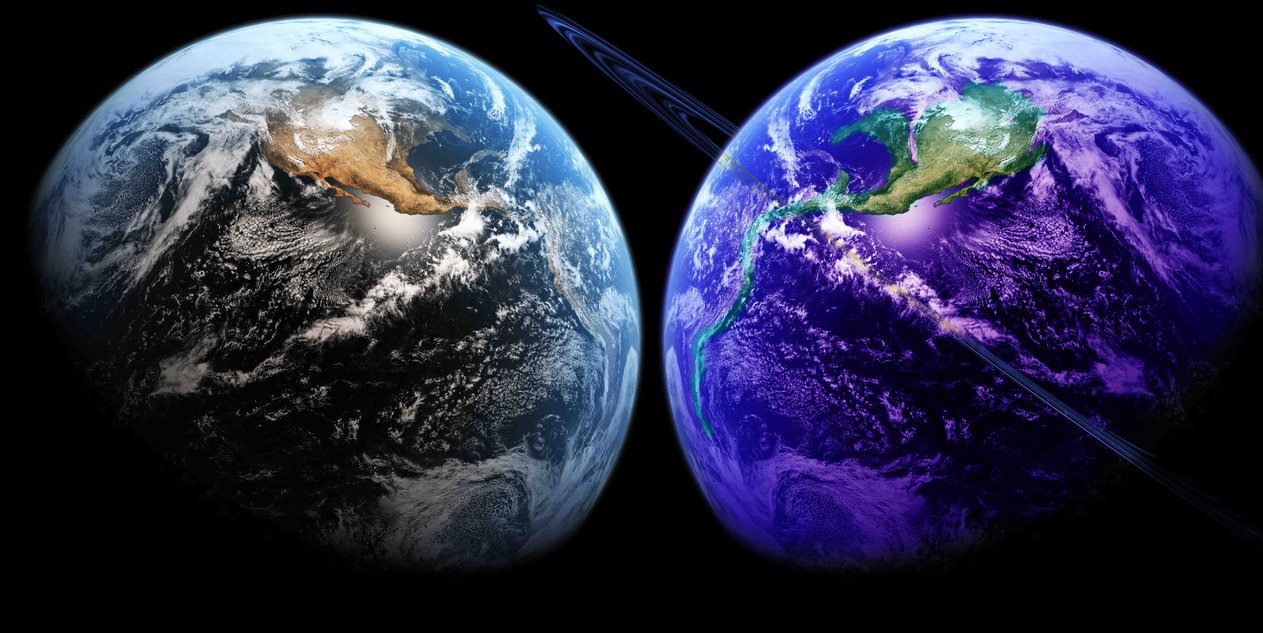The Website ListVerse has a few ideas on what aliens will be like when we finally meet them in an article titled: 10 Traits Aliens Must Have According To Science.
This list starts off making the presumption that Alien is equivalent to those who might come a vistin’, rather than life that we might discover through our own exploration of the Universe. Several of their ideas are misguided or just wrong, and I will tell you why.
10 Traits Aliens Must Have According To Science
Michael Stokes
Really not. These ideas come more from Science Fiction, more than Science.
And not good Sci Fi.
Aggression
What separates humans from other species on the planet in terms of evolution comes down to a simple principle: aggression. For any species to thrive within a given habitat it has to confront adversity and overcome it. These struggles drive evolutionary adaptation. The dominant life form on a planet (which aliens would almost certainly have to be) must have been able to master their environment.A paper published by the University of Missouri suggests this means they would be aggressive—they would populate and conquer their surroundings in order to progress. If they are more intelligent than we are, they will likely see us as a resource, the way we view farm animals and their habitats.
This is just wrong. Humans did not survive due to aggressiveness. There are plenty of animals more aggressive, and better adapted to aggressive behavior than we are. What sets us apart is our ability to cooperate with each other, to overcome aggression by recognizing the common good, and this is, in some regards the opposite of aggression. An alien species would need to have learned to cooperate to travel to the stars. That is the true trait that should be listed here.
Explorers
Any life form that reaches Earth will, by definition, be an explorer. Looking to our own culture for clues, we immediately see how unexplored territories are targeted for their resources. We wonder what lands might possess that can help further our causes. Look at Columbus and the Americas, Marco Polo and the East Indies, the Vikings and most of Europe.According to Stephen Hawking, aliens are likely to seek out other planets in order to colonize them or mine them for resources. Aliens may not come to destroy our planet, but they will in all likelihood seek to exploit what they find to increase their race’s reach, as again this is the hallmark of a developed species.
Hardly even worth mentioning as it could be taken as a given. Though I cannot agree with Hawking in the idea that an alien race would need to find other planets for resources. Even we are looking at our own asteroid belt or mining comets for resources. They are there, in plenty, and in purer form than on a volcanic planet that tends to stir things up. It would take tens of thousands of years, probably more, to use up the resources of one solar system. If they have mined their entire system, unless we are the next nearer system they have nothing to gain by coming here.
Viral and Bacterial Immunity
It’s a common trope in Science Fiction that aliens, having never encountered Earth bacteria before, will succumb to simple diseases which they have no immunity to. Just look at the pilgrims and conquistadors, and the havoc smallpox and typhus wreaked on unexposed native populations. But conquistadors and Aztecs were both human. According to Seth Shostak, senior engineer from SETI, bacteria are limited to the life forms they are biochemically related to.Our germs have evolved to survive on our unique DNA. Even viruses and bacterial infections that infect one species on our planet will only rarely spread to another. Dogs don’t routinely get the ‘flu, for example. Any alien life form that invaded earth will likely be immune to earthly diseases, so don’t expect a War of the Worlds solution.
Bacteria and viruses also adapt, some quite quickly to survive on new sources of energy. This is one of the reasons the HIV virus is so difficult to treat, and one of the reasons why bacteria are used in evolution research. We simply do not have information about alien life to make this statement with any degree of certainty.
They Won’t Eat Humans
What if they want to feed on us? While a scary thought, it’s unlikely. A race advanced enough to achieve space travel surely will have conquered its need to prey on living animals. The journey to earth from any potentially life-supporting planet is incredibly long, and for any species to attempt it they would have to have sustainable food production methods already in place.Further, the digestive setup of a creature that evolved in a different sector of the universe is not very likely to be compatible with the kinds of proteins found on our planet. It would be inconceivable that the minimal nourishment resources found on our planet would ever justify the energy spent to obtain it. An alien race would already be adept at harnessing energy by that point. So we won’t be cattle.
Well, while this idea has many of the same problems that resource mining has, let’s look at it for what it is, simply for the sake of argument. It is very likely that there will be life we do not understand in the Universe. There will also very likely be life we can readily comprehend, and if they were to come here looking for a bunch of Human Happy Meals, then eating us in the flesh need not be necessary to satisfy that craving.
IF Aliens are skipping around the Galaxy looking for something to nosh, then they will have the capacity to render the life forms they find into something digestible and palatable. If they can’t then there is no purpose to be served. At the very least, if they have a similar biochemistry, then we can be rendered down for our component organic compounds.
Impersonal Killers
How many people have ever moved into a new home and found a colony of bugs as an extremely unwelcome surprise? How many of those people then squished each and every offender by hand, swinging the shoe of death over and over again until the job was done? No, most people would call an exterminator to gas the home and lay down poisons for the survivors.Aliens, like any advanced species, will make use of technology to their advantage. They will probably eradicate the life forms on a planet they are considering for their own uses before landing. Forget skies filled with single-pilot saucers firing laser beams at the Capitol Building. Expect a quick and efficient, probably biological, end to our existence.
This is really just a restatement of the Aggression and Resources arguments, and with as little sense as either.
We simple Humans recognize tool use in animals as otherwise unsophisticated as birds, and lower primates. I think a species capable of traversing the vast distances of the Galaxy will not do so on a whim, very likely recognizing our EM emissions long before arriving here and so be aware that an intelligent species exists on this planet. Certainly more than an infestation of bugs. We may be far less advanced than they are, but they will have passed through similar levels of technology as we currently have and will easily recognize us as a technological race rather than bugs to be squashed.
Not Giant Insects
While it’s scary as crap to picture aliens as giant forms of the animals that give us the creeps on Earth, it isn’t scientifically plausible. This concept is born more out of a fear of losing our dominance on this planet combined with an evolved disgust response to disease-carriers.In reality, the body structure of an insect only functions on a small scale. As they do not have oxygenated blood, they cannot take in enough oxygen from our atmosphere to grow larger than they do. In prehistoric times, when the atmosphere was much more oxygen rich, they did grow to distressing sizes, but we’re talking around a meter long. The image of roach-like creatures towering over us is pure fantasy. Sorry Heinlein.
Probably very true.
Super Science
This is a given. However, in a ton of movies, alien races are depicted as feudal, territorial beings that destroy everything in their paths. This doesn’t make sense. In order to organize the kind of effort needed to achieve interstellar travel, a highly advanced intelligence will need to be present. While the species may be, as noted before, aggressive towards other life forms they encounter and even their own race, the chances of them being intergalactic warlords are considerably low.It is more likely that they will be calculating, controlled beings making precise decisions—more like playing chess than dodge ball. Species based in aggression with lower intelligence tend to focus their energies towards one another and survival. For a race of beings to advance beyond the levels we have seen in our own civilization would suggest the need to lay individual differences aside in favor of mutual interests. The skills necessary for long-distance travel and exploration coincide with the key signs of intelligence in nature. Memory, self-awareness, cognition of motives, and creativity must be present before a considerable level of scientific proficiency could ever be achieved.
Doesn’t this contradict several of the previous statements? If this list is, as ListVerse calls it the 10 Traits Aliens Must Have, how can one of them be outright contradictory to the others?
Non-Humanoid
It happens in countless TV shows and movies. Aliens appear on screen that resemble normal humans in face paint (I’m looking at you Darth Maul and every Star Trek character ever). This is convenient from a prop standpoint but not very likely at all in the realm of science. Humans developed as the result of specific environmental conditions.We stood erect to cover greater distances and free our hands to manipulate tools. We formed thumbs as a response to our early tree-dwelling lives. But if a planet doesn’t have trees, it is going to be unusual to develop an appendage adept at manipulating them. There’s no way to tell exactly what an alien species will look like but most likely they will be fast, enabling their early survival and the ability to hunt for prey. They will have very well-developed sensory organs. One would expect (but cannot guarantee) rudimentary traits present in most earth-based life forms: mouths, eyes, a form of hearing and an efficient form of locomotion, such as legs. They must have been predators and will likely possess vestigial traits to indicate this.
Well, we just don’t know now do we? We have no idea what they will look like, so we can neither say they will look like us, or they will not. Odds are against them being human, unless Ancient Aliens believers are correct in one of their scatter-shot ideas of how Humans came to exist, but the fact is we do not know and any claim of knowledge is as invalid as another.
Speech and Writing
For a civilization to develop it must communicate. A long-distance form of communication will have to be present in order to organize in large numbers and disseminate information, which is crucial to social development. Like humans, aliens would need the ability to communicate complex theories with one another, and record them, thereby assisting the next generation through learning. Without some form of writing, it is unlikely we would have ever passed beyond the barrier of individual generational limitations.The type of speech employed by interstellar travellers, and how it might be recorded, is somewhat of a mystery, however. Depending on their environments, sound waves may not be the most effective approach. Perhaps they will use vibrations that are received via specialized sensory organs, or maybe they will, as Hollywood would have us believe, speak telepathically. Telepathy has yet to be proven in any other species however, so that would more likely be a secondary development or the result of technology.
Yes, and then again, no. If morphic field ideas have any credibility (which I doubt, but hey I could be wrong) then there is the possibility of a sort of communal mind, not like ants, but where individuals retain a degree of individuality and specialization, but all have access to communal knowledge. Communication, absolutely, but it is arrogance to presume a limitation on that communication of speech and writing.
No Super Strength
Aliens will not be super strong. Once reaching the level of technological proficiency required to be space explorers, the need for brute strength should be several thousand years removed from its usefulness. These creatures will be lean and efficiently designed beings, using minimal energy to power their bodies.
Energy consumption dictates survival on a large scale. Larger muscles use more energy and require more upkeep, which diverts energy away from evolutionary progress.A scientifically advanced culture would no longer require physical strength to manipulate its surroundings, and a species that has put its evolutionary chips on complex social bonds, abstract thinking and communicating, and fine motor skills and tool manipulation, all of which are necessary to develop interstellar travel, will probably not have the resources left to devote to physical strength or speed.
This is perhaps one of the dumber ideas on the list. First of all, humans have bred beasts of burden for thousands of years, and yet have continued to evolve to larger proportions than our predecessors. We have machines which do our heavy lifting yet continue to invent other machines to aid us in developing the strength of our bodies. Physical health requires the use and development of the physical body. We know this.
And setting that aside, we have already looked at potentially habitable planets of up to four times the size of Earth. If an intelligent species from such a planet came here to visit, their weakest child might very well be far stronger than me at 6′ 4″ and 250 lbs. I may be past my prime but I have still been an athlete and an average human cannot do what I am able to do.
Finally, because the people at ListVerse are apparently not particularly able to count
Functional Appendages
Much the same as humans have thumbs and therefore can use objects to their advantage, aliens would presumably also need to possess this functionality. One simply cannot expect to build and use tools without the ability to grasp them. Giant blobs, or creatures with long unwieldy tentacles are highly unlikely.How would we expect an advanced species of creatures to construct a spaceship and pilot such a vessel across the vast expanses of space without the ability to hold on to, and move, an object with precision? It is well within reason to expect alien life forms to have an even better developed set of appendages than the fingers and thumb system we use on earth. Much like smartphones and advanced machinery on Earth, alien species would probably adapt their technology to their bodies as much as their bodies to their technology, leaving it difficult, if not impossible, for humans to operate alien devices.
Yup, they will need fingers. How else can they flip us off for being so foolish as they fly past?
What traits, you ask, do I believe aliens will possess when we finally discover some?
Okay, you didn’t ask, but I am going to tell you anyway. As the article makes the presumption of discussing intelligent, technologically advanced aliens, I will hold to those parameters.
Physically, we just have no information to work from. There are a few physical traits we can guess at:
Vision
Some form of visual perception is ideal for survival and manipulation of tools. But there are a wide variety of stars out there and the spectrum in which an alien species may see could be different from ours. There is a point at which that spectrum becomes destructive to living tissue as we understand it, and there is a point at which the amount of energy coming from a local star does not support life, so they will likely be in a range of vision which at least partially overlaps our own.
Hearing
Perception of sound does facilitate communication, and we do have more species on Earth that are effectively blind, with excellent hearing than we do that are effectively deaf outside of invertebrates, though many of them sense vibration through their bodies. Unless you support the idea of life evolving in the vacuum of space (which I consider not impossible, but highly unlikely) then life needs an atmosphere, and atmosphere carries sound. A successful species will develop every perception of its environment that facilitates survival. I suspect aliens will have a sense of hearing.
Appendages
As the article above states, manipulation of your environment is best facilitated through use of appendages when you are a low but evolving species. They need not be fingers, on hands, on arms, but something that permits tool use. It is likely they will not be “centipedes” as at a certain point, control of such a large number of appendages probably takes up a significant amount of the brain’s processing power and that does not lead to development in other areas. Insects have other problems as well, but that does not mean that insects on another planet could not develop differently than they have here.
Fire
If you are going to become a space faring race, you need the ability to manipulate your environment, to forgo the need to endure the randomness of nature so you can turn your attention to other things. For this reason I doubt a space faring race developing from an aquatic species. At least not one that must remain in its ocean.
Curiosity
Fundamental to advancement of intelligence is curiosity. The drive to examine, explore and discover the next thing, the awareness that you do not yet have all the answers, or even all the questions and the ability to see beyond the moment. Unlike what the article claims, Curiosity is not served by an aggressive nature, nor is an aggressive nature served well by curiosity. This is one of the reasons I dislike the idea in “Star Trek” of races like Klingons. An inherently violent culture does not develop high technology if their main focus is on killing each other or everyone they meet, which brings us to the next trait.
Cooperation
I doubt anyone today can build a bicycle all by themselves, let alone a spacecraft. Sure, you might be able to assemble one from component parts you purchase, but you will not go from raw materials to fully functioning modern bicycle without a little help. A vehicle capable of interstellar travel does not happen unless you understand the concept of working together to share skills and information on a shared goal.
Respect for Life
This idea may have been better placed after the Klingon comments, but what can you do?
Popular media view philosophical mono-cultures like Klingons, or Reptilians in current UFO lore, as possible. Without a respect for life, such aggressive and warlike philosophies are far more likely to destroy themselves over time than survive to a point where they can carry their aggression to other planets because at some point they must learn cooperation, and must develop a curiosity and at that point they can only question a philosophy of life that seeks only death. That or they just keep killing each other and if they keep killing each other their population remains low enough that there is no drive to expand.
Sure, these are just my opinions, though some of them are repetition of other analyses I have seen. But the ListVerse list is merely the opinion of another, in part based on the opinions of others. I look forward to your input.
Henry@GhostTheory.com
Find us on FaceBook for updates and more.





